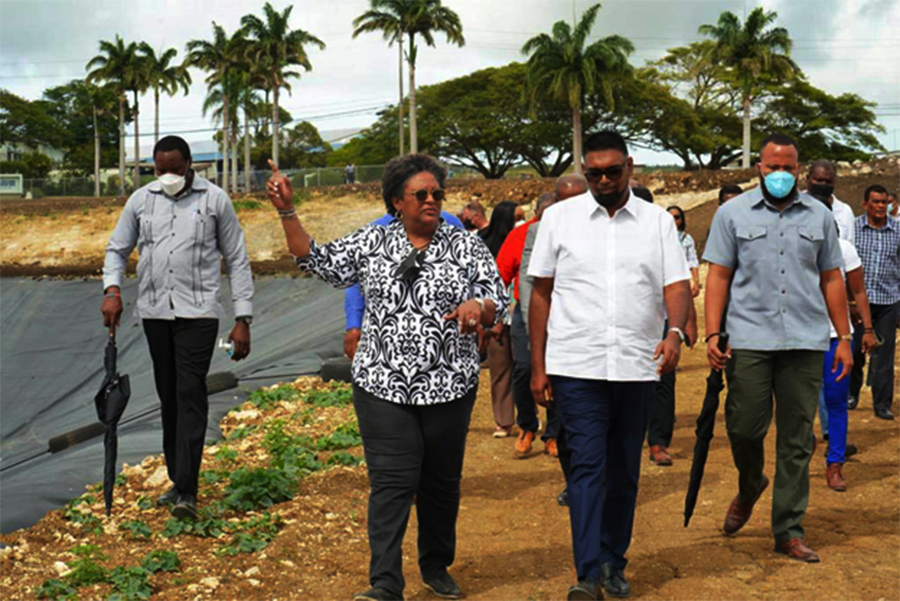The successive ‘shock’ food security scares that have swept across the Caribbean over the past two years as part of a more global food availability crisis has compelled regional ‘experts’ and sections of the media to pay closer attention to the performances of the region’s agriculture and agro-processing sectors as part of a more holistic understanding regarding the evolving condition of our food security bona fides.
A few critical questions have been answered over the past year or so, arguably, the most important one being that it is the smaller Caribbean territories with weak agricultural bona fides and an excessive dependence on extra-regional food imports that are the most vulnerable amongst us. Accordingly, part of the region’s challenge, going forward, if the food security circumstances of the more vulnerable countries are to change, is to find ways of ‘weaning’ those countries off of their extra-regional ‘high dependency’ food-imports-condition and provide them with support towards the creation of their own (however modest) agricultural sectors that could at least serve as a starting point for reducing the extent of their extra-regional food importance.
Analysts of the Caribbean’s current food security challenges can make a case for asserting that the portents for a regional food security challenge had long preceded the contemporary reality. They would argue, with a considerable degree of justification, that the ingrained condition of palaver and prevarication are, arguably, the primary reason why, today, we find ourselves confronted by what is by no means the easy task of reducing extra-regional food imports by 25 per cent by 2025. Arguably the main likely impediments to arriving at this goal are, first, the ingrained ‘foreign foods’ that have embedded themselves in the preferences of some parts of the region and the nexus between what one might call ‘tourist tastes’ and food imports.
However, as much as we may seek to wish the reality away, the contemporary weaknesses in the Caribbean’s food security bona fides cannot be separated from the highly publicised ‘food security noises’ led by Guyana and Trinidad and Tobago several years ago which, the contemporary evidence clearly suggests, fell flat on its face amidst a ‘stop start’ approach dotted with ‘high-sounding’ rhetoric seeking a wider regional chorus which it never really secured. The best that can be said about initiatives like the regional ‘grow more food’ clarion call and the Jagdeo Initiative, tendered as “a strategy for removing constraints to the development of agriculture in the Caribbean, is that driven much more by rhetoric than concrete action they fell flat on their faces in much the same that regional noises about the creation of a Common Agricultural Policy (CAP) would now appear to have been smothered in its own rhetoric.
If the Caribbean has been driven, on account of its more recent food security scares, to commence (with Guyana and Barbados at the helm) the creation of a contingency in the form of a Regional Food Security Terminal, the critical ‘flaw’ in its execution phase has been a mind-boggling failure on the part of those assigned to see it through to keep the entire region none the wiser as to just how the undertaking has been progressing. If, as articulated by its architects, the Regional Food Security Terminal is a worthwhile initiative given what we know to be our food security vulnerability, it makes little sense not to continue to provide the people of the region with at least measured assurances that the project is ‘pushing on’ satisfactorily.
Contextually, there can be no question that this year’s October 9-13 Agriculture Week should, a priori, seek to address and provide answers to issues like just where we are in terms of heading towards some kind of regional food security sanctuary. One makes this point conscious of the fact that here in the Caribbean, events that provide important fora for careful contemplation that result in sound decision-making, are frequently characterised by ‘food fairs’ that often paint a picture that is altogether divorced from reality and stirring speeches crammed with a host of altogether forgettable undertakings.
Regional deliberations on matters that have to do with agriculture must take their cue from the very recent and sharp reminders that have come from the World Bank, particularly, about the extant (and seemingly worsening) global food security crisis driven by factors that include the restraints being placed on the global distribution of grains on account of the vicissitudes of the Russia/Ukraine conflict and more recently by India’s (one of the world’s top three rice producers) restraints of rice exports.
As the Stabroek Business has pointed out previously, there can hardly be a fitter forum than the Bahamas Caribbean Week of Agriculture for the people of the region to be afforded an enlightening update on the status of the Regional Food Terminal. If logistical and other considerations dictate that there can be no expectation that the Terminal can, at this stage, be a ‘finished job,’ the challenge facing those charged with creating the facility is that they have a responsibility to provide incremental, upgraded updates as to just where we are with an undertaking that could well become a critical cog in the wheel of regional food security.





